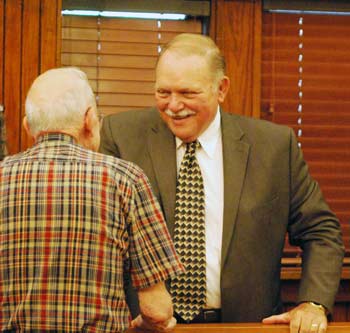Election Board: AAPS Recall Language Unclear
Washtenaw County election commission clarity/factual review hearing (Aug. 1, 2013): Unless the decision is appealed, a recall effort against six of the seven trustees on the Ann Arbor Public Schools board of education will not be moving forward with the originally proposed ballot language.

Donald Shelton, right, talks with former Ann Arbor Public Schools superintendent Scott Westerman, who attended an Aug. 1, 2013 hearing of the Washtenaw County election commission. Shelton, chief judge of the county trial court, chairs the commission, which held a clarity/factual review hearing for recall ballot language against six current AAPS trustees. For 18 years Westerman was a member of the men’s choral group Measure for Measure. Shelton is still a member. (Photos by the writer.)
Jody Huhn had submitted forms on July 17, 2013 to recall trustees Simone Lightfoot, Susan Baskett, Irene Patalan, Glenn Nelson, Andy Thomas, and Christine Stead. Patalan and Nelson did not attend the hearing. Three of the four trustees who did attend – Baskett, Thomas and Stead – addressed the commissioners, arguing that the recall language was not clear and not factual.
Huhn had cited four identical reasons in all six recall petitions: (1) failure to demonstrate thoughtful consideration of constituent priorities; (2) failure to demonstrate transparency in decision-making; (3) failure to demonstrate cohesive and singular direction as evidenced by consistent split voting; (4) failure to provide sufficient backing and support for district superintendent position as evidenced by high turnover rate averaging 2.25 years per term. [.pdf of recall petition language]
Board president Deb Mexicotte was not included because state election law prohibits the filing of a recall petition against elected officials who are in the first year of their term, if that term is longer than two years. Nor can such officials be recalled in the final year of their term, for terms longer than two years. Mexicotte was re-elected to a four-year term in November 2012, for the only AAPS trustee position on that ballot – so she is still serving the first year of her current term. This particular recall constraint was part of broader changes in state election law through Public Act 417 of 2012. [.pdf of Public Act 417 of 2012]
Related to item (4) in the proposed ballot language, the most recent AAPS superintendent, Patricia Green, turned in her resignation in early April after a little less than two years on the job. Her resignation took effect in mid-July.
Huhn had supported Ben Edmondson for the superintendent’s position. Edmonson, principal at district’s Roberto Clemente Student Development Center, had been one of six semi-finalists selected by the AAPS board in its current superintendent search, but was not picked as one of the two finalists. Those two finalists – Brian Osborne and Jeanice Kerr Swift – were not internal candidates. Last month the board offered the job to Osborne, but he ultimately rejected the offer. Earlier this week, the board made an offer to Swift, who has agreed to enter into contract negotiations. She currently is an assistant superintendent at a school system in Colorado Springs.
Huhn attended the recall language hearing, but declined to address the board.
The election commissioners are Donald E. Shelton, chief judge of the Washtenaw County trial court; Larry Kestenbaum, county clerk/register of deeds; and Catherine McClary, county treasurer. After hearing from three AAPS trustees, election commissioners decided to address the issue of clarity first, and if the language were deemed to be clear, they would then move on to discuss the issue of factuality. Initial steps of a recall require that ballot language be deemed clear and factual by the board of election commissioners in the jurisdiction of the elected officials who are the target of the recall.
The requirement that the language be factual was part of Public Act 417, enacted in late 2012. Early in the morning of Aug. 1, Kestenbaum sent an email to the other two election commissioners stating that he does not believe the factual-standard requirement is constitutional. [.pdf of Kestenbaum's Aug. 1, 2013 email] This is the first recall effort launched in Washtenaw County since the factual requirement became law.
After brief deliberations, the three commissioners voted unanimously that the recall language in all six petitions – which contained identical wording – lacked sufficient clarity.
McClary made a motion to address the issue of factuality, stating that the recall language did not appear to be factual. She felt it was important for commissioners to weigh in on that issue. Her motion died for lack of a second. Shelton and Kestenbaum indicated that there was no need to deliberate on that issue, since the question of clarity had already been determined and the law requires that the language must be both clear and factual. [Full Story]




